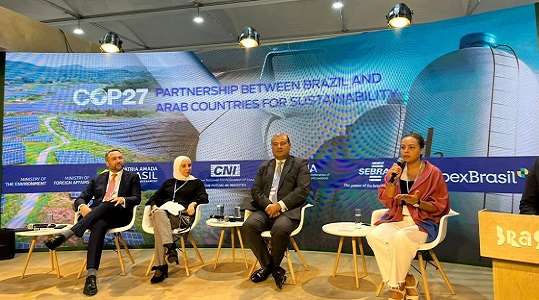The Secretary-General of the Union of Arab Chambers, Dr. Khaled Hanafi, affirmed, “The Arab world’s leadership of the two global meetings on climate change COP27 in Egypt and COP28 in the UAE, reflects the region’s growing importance in the fight against climate change, and its role in advancing the carbon trading market.” He stressed that "reducing greenhouse gas emissions has become an urgent necessity, and the Arab region is most affected by climate change, and the repercussions of climate change in the Arab world are twice the global average."
The Arab-Brazilian Chamber of Commerce held a panel discussion to discuss the opportunities available in the international carbon market for cooperation between Arab countries and Brazil, on the sidelines of the Cop 27 Climate Summit, which is currently being held in Sharm El Sheikh, Arab Republic of Egypt.
The Secretary-General of the Union indicated, "The value of carbon dioxide permits traded in global markets grew 164 percent to a record level of $851 billion in 2021." He stressed "the need to benefit from the European experience not only to copy the structure of the carbon market, but to be more innovative, and designed according to Arab needs, as the carbon market is part of the solution to the problem of climate change, and helps mobilize resources."
He explained, "All countries in the region suffer to varying degrees from the impact of global warming, such as increased water stress, desertification, waste, and ecological degradation, so we find an increasing number of countries in the region want to participate in carbon markets to achieve their climate change goals." "Next year, Brazil's voluntary carbon market is expected to grow up to 20 times. Thus, Brazil has the ability to help Arab countries achieve their mitigation goals," he noted.
For his part, the Secretary-General and CEO of the Arab-Brazilian Chamber of Commerce, Tamer Mansour, called for the need to change economic relations between Arab countries and Brazil, to shift from exports and imports to investment and building partnerships, whether in Brazil or the Arab countries. These partnerships should focus on areas that concern sustainability, the green economy, and environmental protection. He stressed, "Food security is a common factor between the Arab countries and Brazil, and it is not possible to talk about food security without paying attention to sustainability, not only in agriculture and industry, but in investment, and this investment must be green."
The CEO of the Arab-Brazilian Chamber of Commerce suggested preparing a joint working agenda between Brazil and the Federation of Arab Chambers, to present a joint working paper to be presented at the upcoming Cop 28 Climate Summit, which will be hosted by the UAE next year.
The Economic Adviser at the Union of Arab Chambers and Dean of the College of International Transport and Logistics at the Arab Academy for Science, Technology and Maritime Transport, Dr. Sarah Al-Jazzar, reviewed, efforts made by Arab countries to reduce carbon emissions and reach carbon neutrality. Some countries, such as the Kingdom of Saudi Arabia, Sultanate of Oman, United Arab Emirates, Qatar, Iraq, and Bahrain announced zero-emission commitments between 2030 and 2060.
She noted, "The Abu Dhabi Global Market announced a project to establish a regulated carbon exchange and clearinghouse to allow trading in carbon credits and offsets and eventually develop the carbon asset derivatives market."
Source (Union of Arab Chambers)

